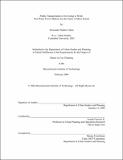Public transportation is not going to work : non-work travel markets for the future of mass transit
Author(s)
Cohen, Alexander Nobler, 1979-
DownloadFull printable version (1.100Mb)
Other Contributors
Massachusetts Institute of Technology. Dept. of Urban Studies and Planning.
Advisor
Joseph Ferreira, Jr.
Terms of use
Metadata
Show full item recordAbstract
For public transportation agencies to attract new riders in an automobile-dominated environment, niche markets must be targeted. The downtown journey to work is already recognized as a successful niche for transit. This thesis seeks to identify non-work travel markets with strong ridership potential. Nationwide data sources indicate that about half of all transit trips in the largest US cities are non-work trips, and that non-work travel has contributed to transit ridership growth in 13 of 20 large US cities. Based on these findings, St. Louis and Chicago are selected as cases for further analysis. St. Louis is the successful case, in which non-work travel contributed to overall ridership growth in the 1990's. Chicago is the baseline case, in which overall ridership declined in the 1990's, with no evidence of growth in non-work ridership. Detailed case studies of St. Louis and Chicago are conducted. First, an overview is presented, providing a description of transit routes; a profile of transit riders; and an understanding of recent ridership changes. Next, non-work ridership markets are identified, based on original analysis of travel survey data and off-peak ridership data. Finally, the characteristics of those markets are reviewed, based on secondary sources, press articles, and existing market research. This is done in order to evaluate the benefits of providing transit service to each market, and the effectiveness of current transit service to each market. Five non-work travel markets are identified in the case studies as strong sources of ridership. (cont.) These markets are: tourists; large events; shopping; younger adults without children, living in urban areas; and people who prefer not to own cars. To pursue non-work ridership growth, transit agencies must be proactive about improving service to meet the unique needs of these markets. Doing so can yield a variety of social, political, and economic benefits for the transit agency, transit riders, and the general public. In conclusion, recommendations are offered for effective transit service to each non-work travel market. General recommendations are offered, as well as specific applications to the Chicago Transit Authority and to Tren Urbano in San Juan, Puerto Rico.
Description
Thesis (M.C.P.)--Massachusetts Institute of Technology, Dept. of Urban Studies and Planning, 2004. Includes bibliographical references (leaves 195-201). This electronic version was submitted by the student author. The certified thesis is available in the Institute Archives and Special Collections.
Date issued
2004Department
Massachusetts Institute of Technology. Department of Urban Studies and PlanningPublisher
Massachusetts Institute of Technology
Keywords
Urban Studies and Planning.